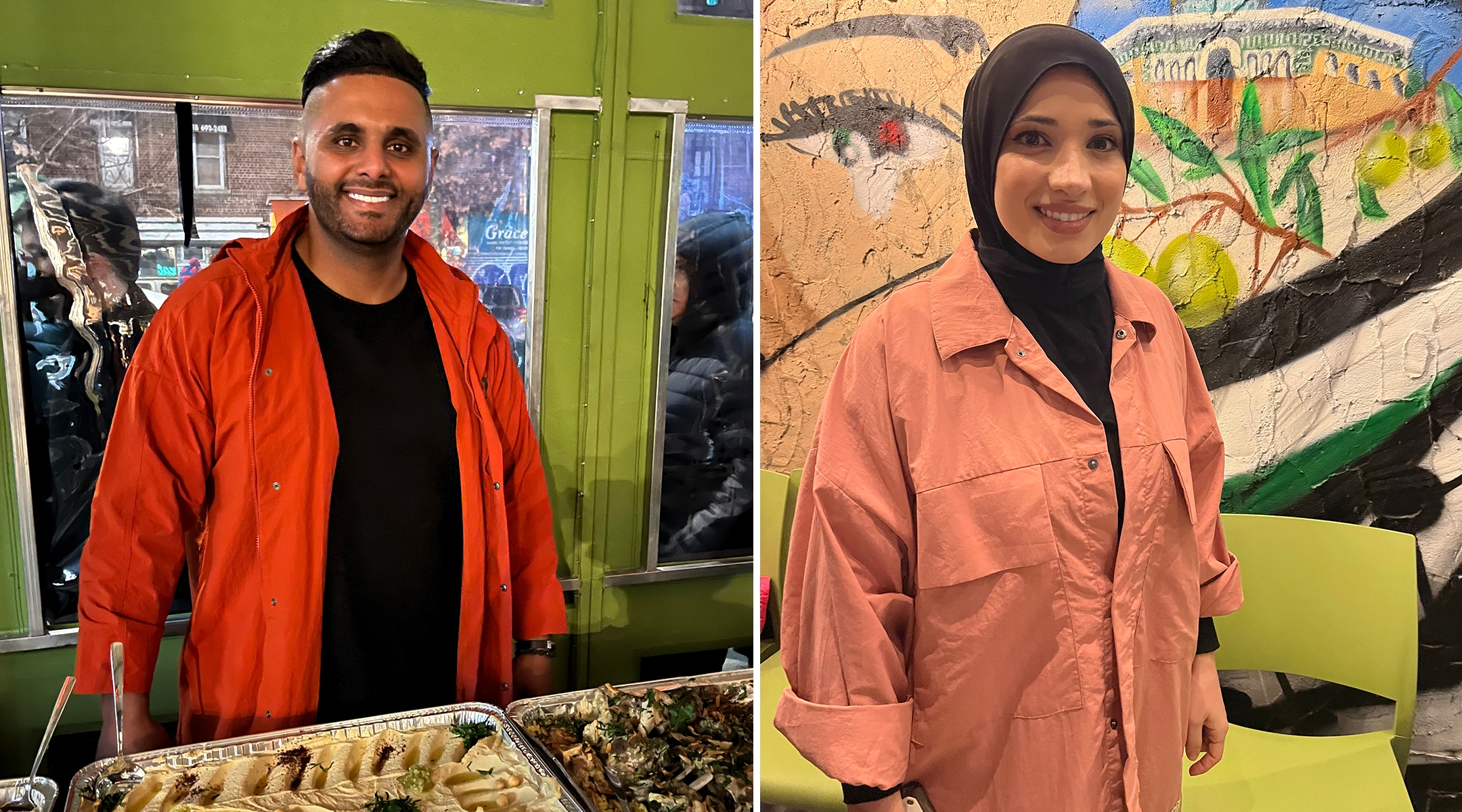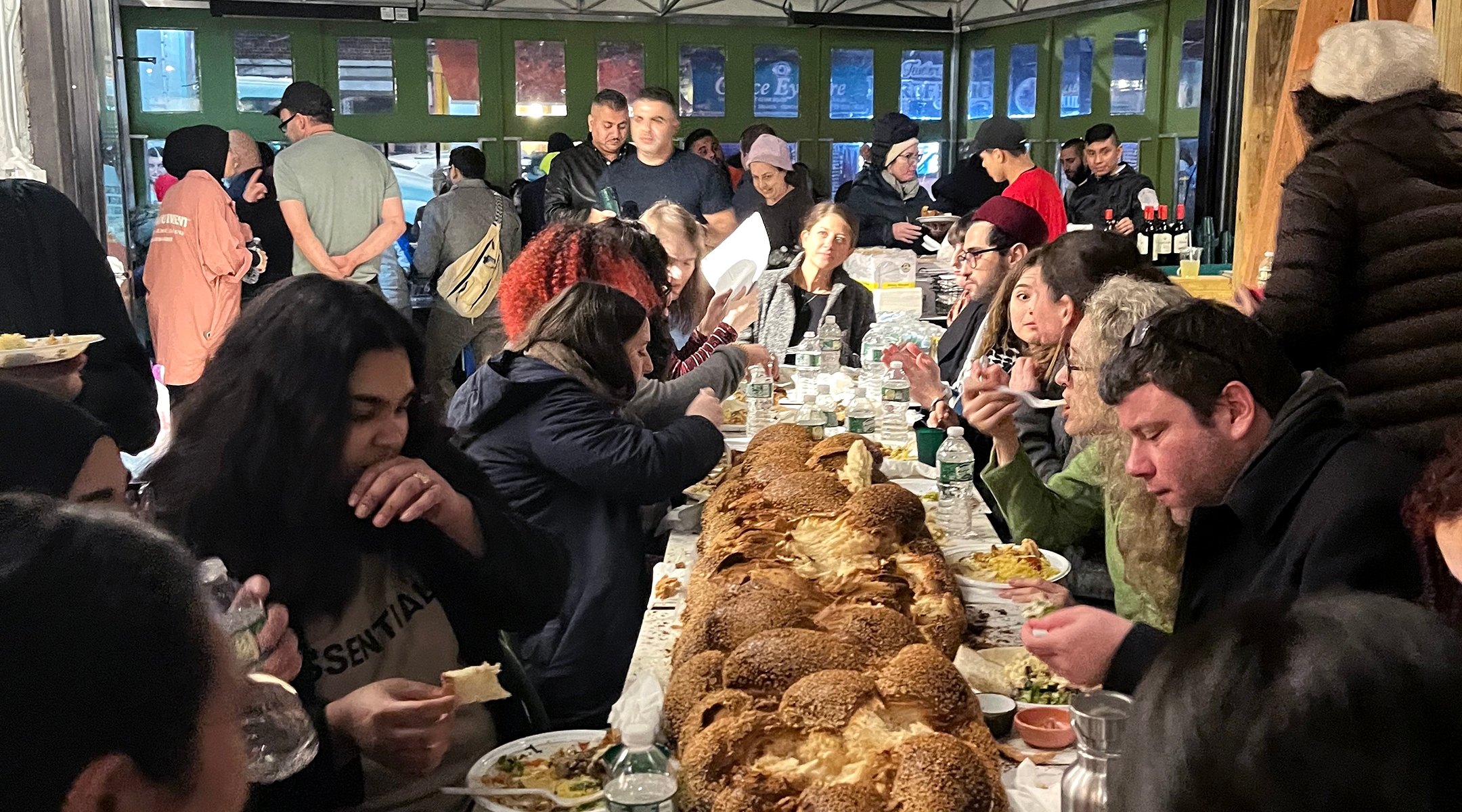(New York Jewish Week) — More than 1,300 people made their way to Ditmas Park, Brooklyn, last Friday night to take part in a free Shabbat dinner at Ayat, a local Palestinian restaurant owned by restaurateur Abdul Elenani and his wife, Ayat Masoud, for whom the restaurant is named.
The dinner was called for 9 p.m., but guests began gathering a couple of hours earlier, milling about outside the restaurant, chatting and waiting to be let inside. Meanwhile, more than 150 people of all ages — several wearing kippot, others with keffiyehs wrapped around their necks like scarves — participated in a Shabbat service that preceded the meal.
Intended as an antidote to turmoil across New York City — including in its Jewish and Palestinian restaurants — since Hamas’ Oct. 7 attack on Israel and Israel’s subsequent war in Gaza, the dinner attracted New Yorkers who remain hopeful that coexistence is possible. Many, but far from all, were affiliated with left-wing and anti-Zionist Jewish groups that have held regular protests calling for a ceasefire since immediately after Oct. 7.
Among the attendees was New York City Comptroller Brad Lander, who learned of the dinner via two Jewish groups he is known to be active in: Jews for Racial and Economic Justice and Kolot Chayeinu, a progressive congregation in Park Slope. He describes himself as supporting a peaceful two-state solution and ending the Israeli occupation of the Palestinian territories.
“This is about a Palestinian making a generous Shabbat dinner without regard for their politics,” Lander told the New York Jewish Week. “Nobody is being asked at the door what their position on the conflict is. Everyone is welcome.”
A steady stream of guests arrived at the restaurant at 1616 Cortelyou Rd. throughout the night. Elenani opened the doors at 9 p.m. and, by 10:30, there was still a line down the block to get in.
The Kabbalat Shabbat service, held in the street outside the restaurant in a tent that Elenani rented for the night, was led by Laura Elkeslassy, a Brooklyn-based singer, actor and educator born in France with roots in Morocco and Israel, along with two members of the Egalitarian Sephardi/Mizrahi Kehilla of Brooklyn, a prayer community of Jews from North Africa and the Middle East.

Owner Abdul Elenani had the idea to host the Shabbat dinner at the Ditmas Park, Brooklyn restaurant, which is named for his wife, Ayat Masoud, right. (Rachel Ringler)
Jessica Roda, an academic who taught a course at Georgetown University that explored the modern history of Jewish-Muslim relations, was one of those who showed up early. She came to Ayat in hope that there “might be healing here,” she told the New York Jewish Week.
“A lot of people are here — different types of people,” Roda said. “Hopefully more of this is what we need. Being together.”
Bringing people together was a key part of Elenani’s plan. The invitation to come to the Shabbat dinner was shared via Ayat’s Instagram and on the Ditmas Park Facebook page, which has nearly 9,000 members. It read, in part: “We invite all our incredible neighbors, especially our Jewish neighbors, to a heartfelt Shabbat dinner at Ayat Restaurant. It’s not just about breaking bread; it’s about breaking barriers, fostering dialogue and connecting on a human level.”
Elenani, who was born in the United States to Egyptian parents, was insistent that the Shabbat dinner be free of charge. “Hospitality is what I was raised up to do,” he said. “If you are going to invite people to your table and your place, if you are actually doing an invite for people to come in for a dinner between Jews and Muslims during this time specifically, charging is the wrong thing to do.”
Elenani has six Ayat restaurants — with locations in Brooklyn, Manhattan, Staten Island and Allentown, Pennsylvania — but he chose to host the Shabbat dinner at the Ditmas Park location because of negative publicity it received at the end of December from the British newspaper The Daily Mail. The reporter took umbrage with Ayat’s menu in which the fish section was called, “From the River to the Sea,” a phrase frequently used by pro-Palestinian activists that Jewish watchdogs view as a call for Israel’s destruction.
Elenani was outraged by the accusation. “All my life I have always wanted to make peace between Jews and Muslims,” he said.
Elenani, who opened his first Ayat restaurant in Bay Ridge in 2020, told the New York Jewish Week that he has long dreamed of opening a warehouse with a kosher kitchen alongside a halal kitchen. It would have, he said, “a large communal table in the middle where people of both faiths come and grab their food and sit together, break bread together and talk about life.”
On Friday night, lots of bread was broken. In addition to saj, a Middle Eastern flatbread, there were seeded water challahs purchased from Gombo’s Heimishe Bakery, a kosher bakery in Crown Heights. A huge challah filled half the length of a table in the center of the restaurant. People sat on either side of it, pulling from the bread while eating their meals and talking.
The idea to hold the event was Elenani’s, but his wife, the restaurant’s namesake, was fully supportive.
“We have always shared the idea that we have nothing against the Jews,” Masoud said. “We always find peace. I am an attorney. I have so many Jewish friends in the legal field. In law school, I used to put together a lot of interfaith events with the Israeli members of school. When Abdul decided to do this — to me, there is nothing more important.”
Elenani said that local members of Jewish Voice for Peace, which describes itself “the largest progressive Jewish anti-Zionist organization in the world,” provided guidance on the ritual aspects of the evening, advising him on challah, candles and wine, which is not normally sold at the restaurant during regular business hours though patrons are invited to BYOB.
Several in attendance Friday night expressed surprise at the size of the crowd, in which guests filled both the upstairs and downstairs dining areas, as well as inside the tent where the service had been held. Surveying the packed room, klezmer clarinetist Michael Winograd was overheard saying, “This is a major Jewish event!” before heading outside to play an impromptu concert on the street.
As for the meal — which Elenani said he paid for out of his own pocket — Elenani used the meat from 15 lambs, 700 pounds of chicken and 100 branzino fish to prepare enough food for 1,000 people. Ayat Masoud’s sister, Asma Masoud, is the chef at the restaurant and she and her staff cooked and served mansaf, a popular Palestinian dish made of chunks of lamb cooked in fermented yogurt; roasted chicken seasoned with a spice rub of allspice, sumac, curry, paprika, garlic, nutmeg, and cinnamon. There was hummus, babaganoush and a chopped salad.
The recipes, said Ayat Masoud, who was born in the United States but whose parents are from Jerusalem, “are not my recipes.They are my mother’s, and her mother before her. They have been passed down for generations.”
For guests who don’t eat non-kosher meat, Elenani brought in Lev, a pop-up catering outfit run by two Israeli expats — Loren Abramovich, hailing from a moshav in the Galilee, and Daniel Soskolne from Jerusalem — who specialize in “the rich mix of culinary traditions Jewish immigrants brought from around the world together with the Palestinian traditions.” They prepared a “kosher-style” chraime, a spicy Moroccan fish stew that was topped with tahini and cilantro and served with fresh chunks of water challah. For attendees who wanted kosher-supervised food, there were sandwiches from a local glatt-kosher caterer — though there appeared to be little demand for them.
Lisa Maya Knauer, a 67-year old anthropologist who lives in Prospect Park South and describes herself as “an anti-Zionist Jew,” came to try the food, to meet people and to support a small, local business.
“As someone who is anti-occupation, and against the war, I wanted to support a restaurant that is owned by a Palestinian person who is very committed to creating goodwill and to creating relationships with neighbors,” she said.
Misha Shulman, the rabbi of the New Shul in Greenwich Village, who was born and raised in Israel, learned about the event from a WhatsApp group for members of left-wing Israelis in New York.
“Even for an anti-occupation Israeli, to be invited by a Palestinian, is rare these days,” said Shulman. “For most Palestinians right now, the situation is so painful and dire that they find it hard to be in community with anybody who supports the existence of the State of Israel.”
“I love this event,” said New York-based musician Noa Fort, who was born in Israel and is a part of the anti-occupation bloc, which had gathered at the restaurant the previous Monday. “It feels like a huge reunion because I know so many people here from so many walks of life and it is lovely to see people who I didn’t know were interested in those bridges and they’re showing up to a dinner like this. I knew they were Jewish or Israeli but [it’s nice] to see them here for similar reasons that I’m here: building bridges and connections between communities.”
The New York Jewish Week brings you the stories behind the headlines, keeping you connected to Jewish life in New York. Help sustain the reporting you trust by donating today.





